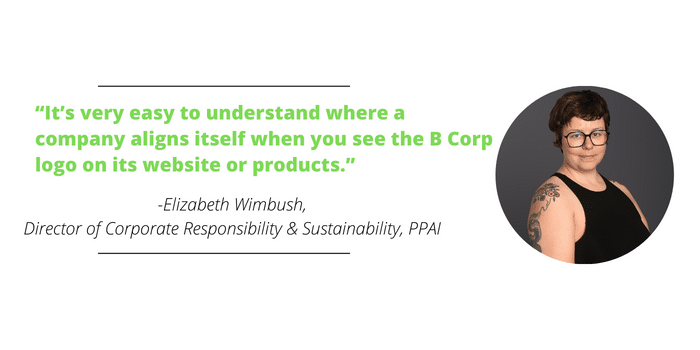Colombus, Ohio-based Leaderpromos (PPAI 176187, D10) has announced that it has received B Corporation certification, arguably the gold standard in sustainability.
- In addition to being B Corp certified, Leaderpromos is a registered Benefit Corporation by the State of Ohio and certified by the Women’s Business Enterprise National Council (WBENC).
- The inaugural PPAI 100 ranked Leaderpromos as the No. 27 distributor.
Among the company’s social and environmental accomplishments are increased philanthropic efforts, offering more sustainable merchandise, instituting valuable team member benefits and successful global recycling programs.
“We’re incredibly honored to join such a respected international community of organizations dedicated to making social and environmental consciousness an integral part of their business strategies,” says Stephanie Leader, founder and CEO of Leaderpromos. “This certification demonstrates our commitment to supporting our valued team members, investing in the environment and communities and partnering with clients to achieve sustainability goals.”

What Is B Corp Certification?
As of December 2023, there are nearly 9,000 B Corporations across 93 countries, according to certification founder B Lab, a nonprofit dedicated to helping companies balance profit with purpose.
- Some of the most high-profile B Corps include Patagonia, Ben & Jerry’s and Eileen Fisher.
Rather than measuring environmental impact alone, the designation signifies that a company is meeting “high standards” of accountability, transparency and verified performance in a variety of factors, such as supply chain practices, charity work and employee benefits.
Several promo firms have achieved B Corp certification in recent years, including Fairware, Genumark, Brand Fuel, Full Line Specialties, Raining Rose, Chameleon Like, McCabe Promotional, Eco Promotional Products and more.
“It’s very easy to understand where a company aligns itself when you see the B Corp logo on its website or products,” says Elizabeth Wimbush, director of corporate responsibility and sustainability at PPAI.

Trust The Process
Established in 2006, B Corp certification has become so highly regarded because of its onerous and time-consuming process. For example, Brand Fuel began the process more than a decade ago, finally earning certification in September 2022.
The process consists of three steps:
- Achieving a B Impact Assessment score of 80 or above and passing the risk review.
- Making a legal commitment by changing corporate governance structure to be accountable to all stakeholders rather than just shareholders, as well as achieving benefit corporation status if available in your jurisdiction.
- Exhibiting transparency by allowing information about performance measured against B Lab’s standards to be publicly available on your B Corp profile on B Lab’s website.
The first step is the most difficult because the B Impact Assessment tool measures your company’s practices and outputs across five categories: governance, workers, community, the environment and customers.
RELATED: B Corp Certification: Why Promo Firms Endure The Painstaking Process
Applicants are not only grilled with a series of questions based on each category, but also must provide documentation to verify their answers. A full-time job in and of itself, the process is best carried out by teams consisting of employees from different departments.
Here are some sample questions:
- What percentage of management is from underrepresented populations?
- What portion of your management is evaluated in writing on their performance with regard to corporate, social and environmental targets?
- Does your company monitor and record its universal waste production?
- How do you verify that your product improves the impact of your client organizations?
After an analyst reviews the initial answers, it’s time for follow-up questions and requests for more data. The lengthy, back-and-forth process requires applicants to perform their due diligence regarding every aspect of their operation.
“It gets into pretty nitty-gritty detail,” Wimbush says. “Because promotional products companies work with such a wide range of different customers and suppliers, it’s a lot of data collection.”


